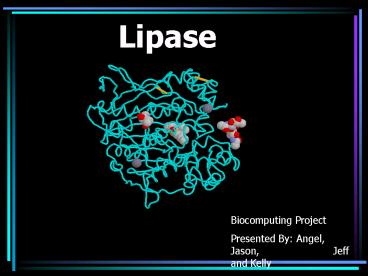Lipase - PowerPoint PPT Presentation
1 / 31
Title:
Lipase
Description:
Lipase responsible for fat absorption in the small intestine ... Possum carboxylesterase. Domestic horse butyrylcholinesterase. Homo sapien acetylcholinesterase ... – PowerPoint PPT presentation
Number of Views:2791
Avg rating:3.0/5.0
Title: Lipase
1
Lipase
Biocomputing Project Presented By Angel, Jason,
Jeff and Kelly
2
Outline
- Background Information
- Structure
- Phylogeny/Homology
3
Overview
- Lipase responsible for fat absorption in the
small intestine - Its activity depends on presence of pancreatic
colipase and bile salts - Lipase insufficiency can be managed by diet
- Lipase malabsorption can be induced by Xenical ?
weight loss
4
Background Information
- Lipases hydrolyze triacylglycerols, releasing one
fatty acid at a time and forming diacylglycerols,
monoacylglycerol then finally, glycerol. - Lipase is essential in most if not all living
organism - Lipases also used by fungi and bacteria to
facilitate nutrient absorption from the external
medium
5
Background Information
- Pancreatic Lipase
- Released into duodonem
- Hydrolyzes triacylglycerols (TAG) into free fatty
acids and monoglycerides - TAGs are emulsified within bile salt micelles
Main enzyme responsible for fat absorption in
small intestine
6
Background Information
- Pancreatic Colipase (PC)
- Secreted as procolipase in a 11 ratio with PL
- PC can bind to the bile salt micelle
- PC necessary for PL function
7
Structure of Lipase
8
Overview
- Has only one protein chain (Chain A)
- 534 amino acids long
- 12 ß sheets
- 25 ? helices
- No DNA chains
- Has two Disulfide bridges
- Has six ligands
9
(No Transcript)
10
Ligands
11
1. (1R)-Menthyl hexyl phosphonate group
- Center of the protein
- Connected to lots of different Amino Acids
- Two Serines and two leucines
12
(No Transcript)
13
2. 3. Calcium Ions
2. Calcium Ion A
- Interacts with Asparagine, amino acid 260
- Also with one hetero atom
14
2. 3. Calcium Ions
3. Calcium Ion B
- Interacts with Glycine, amino acid 326
- Connected to multiple heteroatoms
15
4. N-Acetyl-D-Glucosamine (NAG)
- Interacts with asparagine 222, lysine 180,
asparagine 314, Valine 313, and tryptophan 221.
16
5. NAG group
- Two NAG ligands interacting with each other at
the same site. - Also interact with Tyrosine 299, aparagine 351,
valine 352, glutamine 357, and glutamate 70
17
(No Transcript)
18
Active Site
- Not referenced in Protein Explorer, so determined
via conserved regions.
19
(No Transcript)
20
Protein Family
- Multiple possibilities
- Carboxylesterase (E of 6e-91)
- Lipolytic Enzyme (E of 2.8e-5)
- Hydrolase (E of 0.19)
- However, often classified as a Hydrolase by
various databanks (such as GenBANK file in NCBI).
21
Structural Motifs
- Multiple phosphorylation sites
- Contains much N-terminal glycine which have a
covalent bond with myristate (a C-14 saturated
fatty acid).
22
Predictive Software Analysis
Generally predicted the locations of helices and
sheets, but not with perfect accuracy.
23
(No Transcript)
24
Transmembrane Properties
- Lipase is not an integral membrane protein
- No interesting relatives
25
Homologs to 1LPM lipase
Phylogeny
- Gram negative bacteria
- Homo sapien carboxylesterase
- Possum carboxylesterase
- Domestic horse butyrylcholinesterase
- Homo sapien acetylcholinesterase
- Roundworm acetylcholinesterase
26
E-Values
E-values of Homologs
e-value Monodelphis domestica 7e-41
Xanthomonas 8e-43 Homo sapien
acetlycholinesterase 7e-40 Homo sapien
carboxylesterase 4e-35 Meloidogyne
1e-41 Equus caballus 1e-41
27
Multiple Sequence Alignment
- More conserved residues
- Not many
- conserved groups
28
Phylogenetic Tree
- Unrooted
Values used to determine bootstrapping values
29
Phylogenetic Tree
- Calculated
- Bootstrapping
- values
100
100
100
88.4
30
What's interesting?
- Expected bootstrapping values closer to 100
- Actually 88.4
- Less Confidence
31
REFERENCES
- Svendsen A (2000). "Lipase protein engineering".
Biochim Biophys Acta 1543 (2) 223228. - Winkler FK, D'Arcy A, and W Hunziker (1990).
"Structure of human pancreatic lipase". Nature
343 (6260) 771774. - Algorithms Used
- Protein Explorer
- Jmol
- Consurf
- Biology Workbench (PELE, TMAP, GREASE, TMHMM,
BLASTP, PROSEARCH, CLUSTALW, CLUSTALTREE,
DRAWTREE ).

